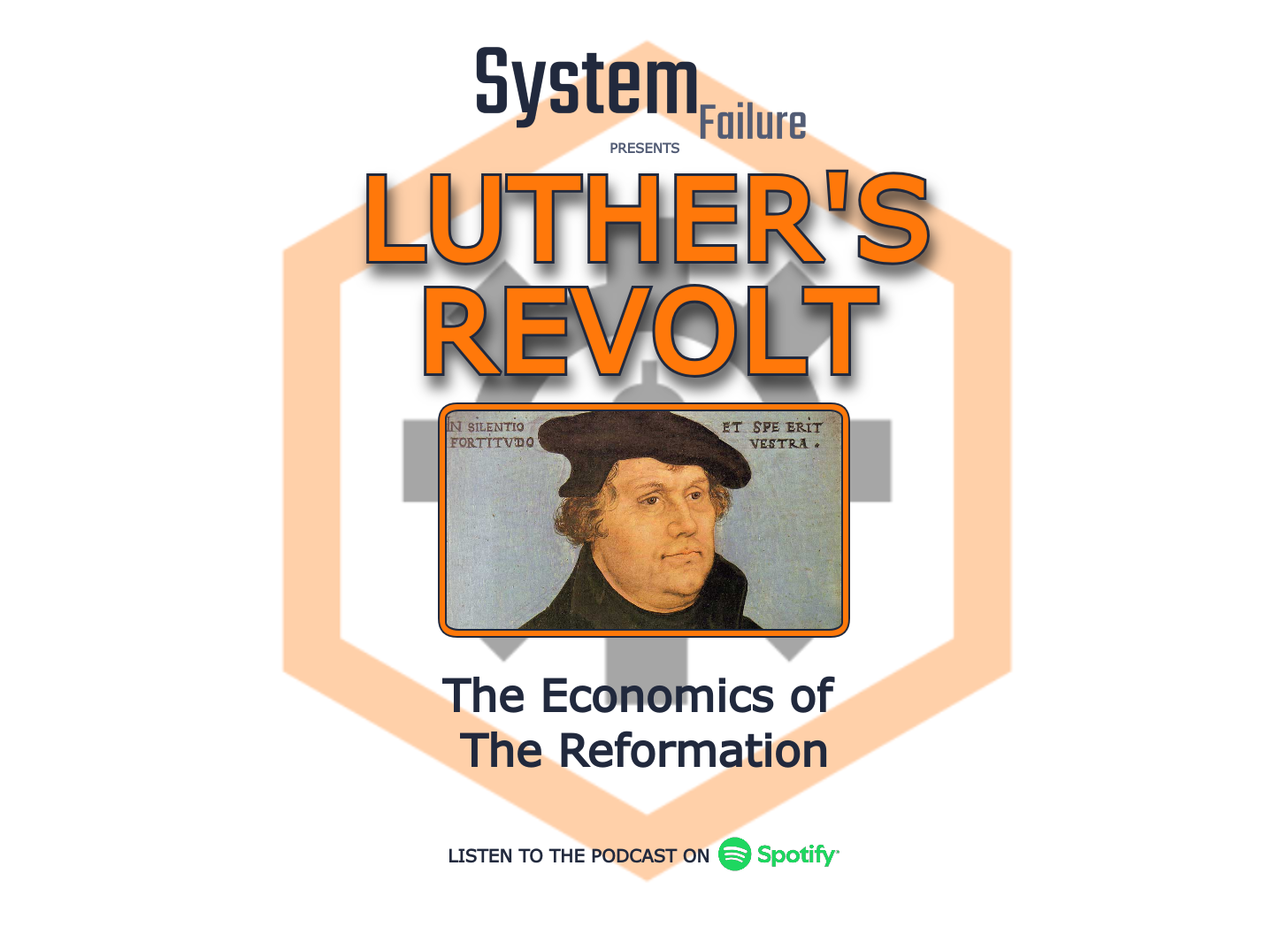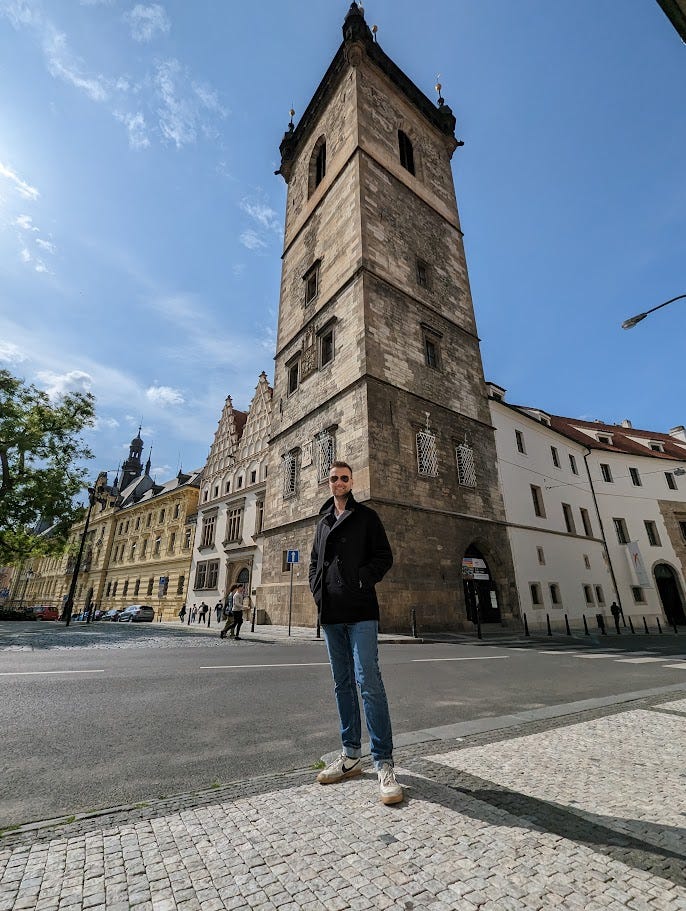Overview
Last week’s essay was about the Roman Catholic Church succumbing to “pleonexia”, or wealth addiction as described by Plato. During the Medieval period, the Sale of Indulgences was the Church’s signature brand of corruption. It made the Popes fantastically wealthy. But eventually the corrupt practice also cost them the position of geopolitical authority they enjoyed during the Middle Ages. Just as—a millennium prior—greed had cost the Caesars their empire.
This week’s essay focuses an economic lens on the deeds of Martin Luther and two of his predecessors, whose responses to church corruption touched off The Reformation. It contains guest appearances from legendary historians Will and Ariel Durant, who have a particular style that’s impossible to replicate…
Introduction
The story of Martin Luther and his predecessors illustrates the fundamentally intertwined natures of religion and economics. The Reformation was not merely a revolt against the naked corruption of the Roman Catholic Church. It was also a wholesale shift in economic systems, from the exploitative lord/peasant economy of the Middle Ages to our modern employer/employee economic arrangement.
John Wycliffe
The wealth of the Vatican is as legendary today as it was during the Middle Ages. But their hoard contrasts awkwardly with actual scripture, which is filled with harsh condemnations against wealth accumulation. For centuries, the Popes avoided that awkwardness by decreeing that all Bibles must be rendered in Latin. That way, only members of the Church could read them. But in the 14th Century, an English radical named John Wycliffe defied Rome and translated the Bible into English anyway. This action gradually snowballed into The Protestant Reformation.
Historians Will and Ariel Durant wrote that the availability of Bibles in languages people could actually understand “was a blow to political as well as to religious orthodoxy. It exposed the compromises that the secular clergy had made with the nature of man and the ways of the world; it revealed the communism of the Apostles, the sympathy of Christ for the poor and oppressed; in these respects, the New Testament was for the radicals of this age a veritable Communist Manifesto. Peasant and proletarian alike found in it a divine warrant for dreaming of a utopia where private property would be abolished, and the poor would inherit the earth.”1
Wycliffe died of old age on the very last day of 1384, before the advent of the printing press. Dying of natural causes was a feat that very few enemies of the Church managed to achieve. At the Council of Konstanz in 1415, the Roman Catholic Church posthumously declared Wycliffe a heretic and excommunicated him. But since he had died 30 years earlier, that was the extent of his punishment.
Jan Hus
Such was not the case for Jan Hus, who had been inspired by Wycliffe to translate the Bible into the Czech language. He was summoned to Konstanz under a guarantee of protection, only to be promptly executed upon arrival. Back in his home city of Prague, Jan Hus’s multitude of followers turned violent once they heard about his betrayal. They stormed the New Town Hall, got their hands on seven Catholic members of the city council, and threw them out the windows to their deaths. It was the very first of the notorious Defenestrations of Prague.
Martin Luther
Both Wycliffe and Hus made names for themselves by questioning the previously unquestionable authority of the Roman Catholic Church. But they hadn’t been able to topple that authority. That feat was accomplished by one of history’s most grumpy and least agreeable figures, the German monk Martin Luther.
Luther wrote up an exhaustive list of his complaints about the corruption of the Vatican, and then nailed the resulting document to the door of his local church in Wittenberg, Germany. The year was 1517, and in those days the doors of public buildings served as bulletin boards. Chief among Luther’s complaints was the Sale of Indulgences, where the Roman Catholic Church sold its flock God’s forgiveness from their sins. He also translated the Bible into German. Because Luther was protesting against Church corruption, his followers became known as “Protestants.”
Luther’s actions earned him the nickname “The Mad Monk of Wittenberg,” because criticizing the Church usually resulted in summary execution, as Jan Hus discovered. But Luther was wise enough not to allow himself to fall into the hands of the Vatican. He hid out far from Rome in the northern regions of Germany, where he had powerful Protestant friends.
However, the main reason Luther succeeded where Wycliffe and Hus failed was not his discretion. Quite the opposite. It was because he had the newfangled printing press to use as a weapon against the Vatican. The one-two punch of the surly Luther and the printing press unleashed chaos after his German translation of the Bible was widely distributed.
The circulation of Bibles in common languages had broad economic implications. The Reformation was undoubtedly a spiritual turning point and—after the collapse of Church authority—a political reorganization for Europe. But it was principally an economic revolution: the peasants were revolting against feudalism itself.
“The religious revolt offered the tillers of the fields a captivating ideology in which to phrase their demands for a larger share in Germany's growing prosperity,” continued the Durants. “The hardships that had already spurred a dozen rural outbreaks still agitated the peasant mind, and indeed with feverish intensity now that Luther had defied the Church, berated the princes, broken the dams of discipline and awe, made every man a priest, and proclaimed the freedom of the Christian man. In the Germany of that age Church and state were so closely meshed- clergymen played so large a role in social order and civil administration that the collapse of ecclesiastical prestige and power removed a main barrier to revolution.”2
Conclusion
The Protestant Reformation was both a spiritual and political struggle. But there is an even larger economic aspect to the story. Translating the Bible into common languages had far-reaching economic consequences that shaped the world we live in today. The Reformation was simultaneously a revolt against the authority of the Roman Catholic Church and against the unfair and oppressive lord/peasant economic arrangement that dominated the Middle Ages.
Will & Ariel Durant, The Reformation, 1957, page 382
Will & Ariel Durant, The Reformation, 1957, page 382






